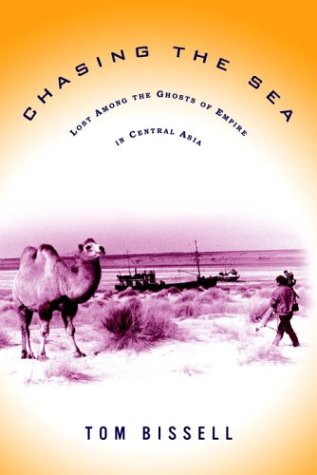
Uzbekistan RPCV Tom Bissell writes Chasing the Sea' - a postcard sent from a new wasteland
Uzbekistan on No Dollars a Day
'Chasing the Sea' is a postcard sent from a new wasteland
by John Freeman
Tom Bissell
Chasing the Sea
Pantheon
First-rate travel writers are a bit like pied pipers: If they play their tune well enough, readers will follow them anywhere. In Chasing the Sea, his fantastic memoir of traveling through the former Soviet Republic of Uzbekistan, Tom Bissell proves that at the age of 29 he is a maestro of the genre. Read this book and it will be difficult to imagine not traipsing after him.
That's not to say the territory he crosses is necessarily scenic, with natural splendors and happy locals. Bissell first came to Uzbekistan in 1996 as a Peace Corps volunteer. Illness and personal drama abbreviated his stay to just seven months. In 2001 he returned, ferrying money to the offspring of a political exile--35 tins of smokeless tobacco--and bringing too his own deep curiosity about the country's infamous Aral Sea.
In 1960, this body of water was the size of Lake Michigan, an essential resource for irrigating the country's cotton crops. Today, it is the world's worst ecological disaster. In the past four decades, industry has siphoned away 70 percent of the sea's volume, destroyed many of its species, filled it with pollutants, and turned the freshly revealed seabed into a wasteland dotted by abandoned ships, sea salt, and trash.
The virtue of Chasing the Sea is that Bissell does not approach this ecological nightmare with an obvious environmental agenda, nor does he fixate on culpability. Instead, he uses the sea as a lens through which to view a strange Central Asian land and people. Why would a country neglect its resources so much? What history came before its modern incarnation?
Bissell's guide into the Uzbek through the cities of Tashkent, Samarkand, and Bukhara is a handsome young translator named Rustan, whose gimlet-eyed bitterness mirrors what the men witness on their journey. Sitting at a bar before their trip begins, Bissell takes out a bill and comments how the money harkens back to the nation's past. "That's because our past is better than our future," Rustan replies. "Especially when we can make our past whatever we want."
While Rustan is a useful sounding board for such issues, Bissell's prose is the engine that keeps the trip going. His writing rips and snorts and coughs along like the sturdiest of Land Rovers. Full of colorful metaphors and apt pop culture references, it captures the country's past and present. He describes passengers in the Tashkent subway as an "igloo of metropolitan apathy"; Russia's involvement with Central Asia is "akin to that of an irresponsible bankrupt maxing out a stack of credit cards in order to date women who do not love him."
Most important, Bissell describes the land so perceptively it feels like these fresh ruins are rolling right before us out the window of a rattling truck. Here he is depicting a drive out of Samarkand:
The cotton fields we passed were choked and dry, the farmland nothing but dunes, the sand whitish with salt deposits. Along the road's edges were no American-style "beauty strips" to hide what had been done just over the hills. What was happening to this land was so obvious there seemed scarcely any need for outcry.
At the start of his story, Bissell remarks that Germans are Uzbekistan's most frequent visitors. However ably this pied paper plays his sorrowful tune, it's unlikely that Chasing the Sea will turn this place into another Provence or Tuscany. But thanks to its rich explanation of Uzbekistan's history and its beautiful descriptions of the landscape and people, Chasing the Sea might prove more enjoyable than actually being there.
